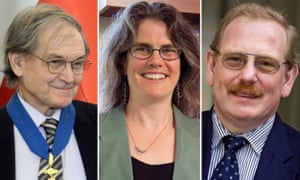
The Nobel Prize in Physics was awarded to three astrophysicists Tuesday for work that was literally out of the world, and indeed the universe. They are Roger Penrose, an Englishman, Reinhard Genzel, a German, and Andrea Ghez, an American. They were recognized for their work on the gateways to eternity known as black holes, massive objects that swallow light and everything else forever that falls in their unsparing maws.
Black holes were one of the first and most extreme predictions of Einstein’s General Theory of Relativity, first announced in November 1915. The theory explains the force we call gravity, as objects try to follow a straight line through a universe whose geometry is warped by matter and energy. As a result, planets as well as light beams follow curving paths, like balls going around a roulette wheel.
Einstein was taken aback a few months later when Karl Schwarzschild, a German astronomer, pointed out that the equations contained an apocalyptic prediction: In effect, cramming too much matter and energy inside too small a space would cause space-time to collapse into a point of infinite density called a singularity. In that place — if you could call it a place — neither Einstein’s equations nor any other physical law made sense.
Einstein could not fault the math, but he figured that in real life, nature would find a way to avoid such a calamity.
Picture Credit : Google

